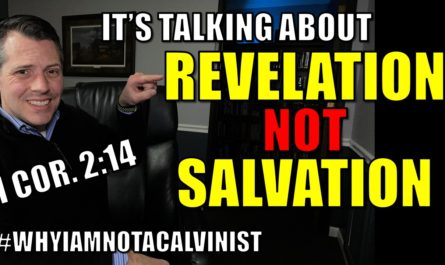Have you ever been reading the Bible and suddenly you see something that makes you go, “What? It says that?”
We find one of those places in Mark 4. Jesus had just told the parable of the sower and the seed, and His disciples and some others pulled Him aside to ask Him what it meant.
But when He was alone, those around Him with the twelve asked Him about the parable. And He said to them, “To you it has been given to know the mystery of the kingdom of God; but to those who are outside, all things come in parables, so that ‘Seeing they may see and not perceive, and hearing they may hear and not understand; lest they should turn, and their sins be forgiven them.'” (Mark 4:10-12)
Wait a minute—Jesus did not want these people to hear and understand?
Obviously, the first question we may have here is why would Jesus do this? Why would He want to hide the truth from some people?
I think the answer, or at least one possible answer, is that this was a temporary situation.
Think about it—what if every person that listened to Jesus believed? He would have really struggled to find someone to nail Him to the cross. Eventually, He would have to return to the Father in defeat, leaving behind a massive following of fans whom He could not permanently save because He was unable to pay for their sins. Some had to reject Him to fulfill God’s plan of salvation.
Do not forget, however, that there is nothing I see here that indicates that the truth was to be permanently hidden from these people. I cannot help but wonder how many of these folks understood and believed after the resurrection or at Pentecost.
Now, I want to point out two reasons that I think this passage undermines Calvinism. The first undermines total depravity and the second undermines unconditional election.
1. These people could have believed
Jesus made it clear: He spoke in parables so they would not believe. Which means, if He would have been clearer, they could have believed. If they were totally unable outside of a regenerative experience, all He had to do was refrain from regenerating them.
However, knowing the power of His teachings, and knowing that they could accept His teaching as truth, He spoke in parables, leaving them saying, “Huh?”
In my opinion, this undermines total depravity (or total inability) because clearly, these folks could have believed, even though Jesus did not want them to at that time.
2. God was respecting the decision they already made
Apparently, these folks had already decided that they weren’t too interested in Jesus. I think Jesus made that clear when, in His explanation to the Disciples about why He spoke in parables, He quoted from Isaiah.
Isaiah’s original quote comes when he was receiving a vision of being in the throne room of God.
Also I heard the voice of the Lord, saying: “Whom shall I send, And who will go for Us?” Then I said, “Here am I! Send me.” And He said, “Go, and tell this people: ‘Keep on hearing, but do not understand; keep on seeing, but do not perceive.’ “Make the heart of this people dull, and their ears heavy, and shut their eyes; lest they see with their eyes, and hear with their ears, and understand with their heart, and return and be healed.”
(Isaiah 6:8-10)
There it is again—God not wanting some people to hear and understand. Why would He command Isaiah to make their hearts “dull,” so they do not understand?
Isaiah was being sent to a rebellious Israel—a nation that had repeatedly rejected God’s advances. These folks had already made their own decision—they were not going to respond to God.
Choosing to go their own way, they rebelled against God’s commands. God’s response? “OK, just keep going that way and see how it works out for you.” Or to put it another way, “You made your bed, now lie in it.”
Sure, Isaiah was to continue to preach to these people, but the more they heard the message, the harder their rebellious hearts would become.
It’s like how you feel when someone keeps hounding you for the same offense. After a while, you want to keep doing it because to reward their nagging with further irritation.
Jesus used Isaiah’s words to describe the hardened folks of His day. They already had general revelation and the chance to see Jesus at work. However, they rebelled against what they knew. Jesus responded by hiding the truth so these already hardened people would continue to be hardened by hearing just enough of His message to continue in their hardness, but not enough to fully grasp it. Eventually, this would lead to His crucifixion, fulfilling the destiny of His incarnation.
The same time Jesus was hiding the truth from those on the “outside,” He was clarifying it to His disciples. He had chosen them for a reason—they would not harden their hearts in response to the light they received. Jesus would then take them behind closed doors to unveil the truths He had hidden from the hardened masses.
We could liken His actions to a meal we might set up for a local homeless population. We advertise and spend all day cooking the food, but many decided not to show up. Finally, we take down the signs, close the doors, and feed only those who responded. Those inside get to eat; those outside are no longer invited—not this time, anyway.
Basically, God (in Isaiah) and Jesus (in Mark) were honoring the choices of people. Some folks refused to respond to the light given to them, so they were encouraged along their self-imposed path to fulfill the greater plan of God.
To me, this undermines the Calvinistic idea of unconditional election, because there is nothing in either Isaiah or Mark that indicates that these folks could not believe because they were not chosen. Rather, they had chosen not to respond to what they had been given, so they were temporarily put in a position where their hearts would become harder.




“He would have really struggled to find someone to nail Him to the cross.” Imagine! God letting people repent and then forgiving them without needing to pay himself to himself to please himself, saving us from himself!
Instead, Christianity has to murder an innocent man, declare all the rest of humanity guilty of infinite sin for being imperfect, and actively make people keep sinning just to show off how long he can stand by watching them sin Romans 9:22). What a gospel you have! The good news is that you are being threatened with eternal torture for not joining our religion instead of being guaranteed it for being an imperfect person making you infinitely offensive to the God who made you imperfect using Adam as an excuse… such joy it is that I’m presented with an ultimatum of coercive Stockholm Syndrome instead of just unreasonable demands.
Can’t argue with a thing you say here.
Right on! This is exactly what I am seeing too. These people do not know what good and evil is, they are delusional, and they do mental gymnastics to make a lie a truth.
I don’t agree to your explanation.
Jesus used parables to keep the unbelievers among the crowd engaged. They will be puzzled and would think about the meaning of these parables. If told the bare truth or the interpretation, they would have left and reject Him right away and not finish Jesus teachings because they have eyes that do not see and ears that do not hear. Just like some people during the Great Exile in Moses time. They’ve seen and experienced the greatness of God and all His wondrous works but still they rejected Him.